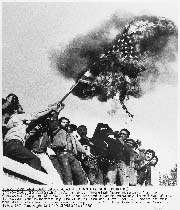The Termination of United states Spy Network
Iran hostage crisis was a diplomatic crisis between Iran and the United States that was triggered by a group of militant university students who took over the U.S. diplomatic mission in Tehran on November 4, 1979. The students were supported by Iran's post-revolutionary regime that was in the midst of solidifying power. The students objected to U.S. influence in Iran and its support of the recently fallen Shah of Iran, Mohammad Reza Pahlavi, who had been restored to power by a CIA funded coup in 1953. They held 63 U.S. diplomats and three other U.S. citizens hostage until January 20, 1981. Of those captured, 52 were held hostage until the conclusion of the crisis 444 days later.

The ordeal reached its climax when the United States military attempted a rescue operation on April 24, 1980. The failure of Operation Eagle Claw resulted in the deaths of five United States Air Force Airmen and three U.S. Marines. Some political analysts believe the crisis was the primary reason for U.S. President Jimmy Carter's defeat in the U.S. presidential election in November 1980.[
The crisis ended with the signing of the Algiers Accords in Algeria on January 19, 1981. The hostages were formally released into United States custody the following day. The release took place just minutes after Ronald Reagan was officially sworn in as Carter's successor.
Rescue attempts
Rejecting Iranian demands, Carter approved an ill-fated secret rescue mission, Operation Eagle Claw. On the night of April 24, 1980, several C-130 transport airplanes met up with eight RH-53 helicopters at an airstrip in the Great Salt Desert of Eastern Iran, near Tabas. Two helicopters broke down in a sandstorm, and a third one was damaged on landing. The mission was aborted, but as the aircraft took off again one helicopter clipped a C-130 and crashed, killing eight U.S. servicemen and injuring several more. In Iran, Late Ayatollah Khomeini's prestige skyrocketed as he credited divine intervention on behalf of Islam for the mission's failure.
After the failed mission on April 24th, Carter spoke to the american people on April 25th regarding what had occured the day before during the attempted rescue operation. The failure of the rescue operation further sunk Carter`s political boat and made his chances for reelection in 1980 even more unlikely.
A second rescue attempt used highly modified YMC-130H Hercules aircraft. Outfitted with rocket thrusters fore and aft to allow an extremely short landing and takeoff in a soccer stadium, three aircraft were modified under a rushed super-secret program known as Operation Credible Sport. One aircraft crashed during a demonstration at Duke Field at Eglin Air Force Base Auxiliary Field 3 on October 29, 1980, when its landing braking rockets were fired too soon. The misfire caused a hard touchdown that tore off the starboard wing and started a fire; all on board survived. The impending change in the White House following the November election led to an abandonment of this project. The two surviving airframes were returned to regular duty with the rocket packages removed. One is on display at the Museum of Aviation located next to Robins Air Force Base in Georgia.
Ayatollah Khamenei View
The Supreme Leader recalled the events which took place on November 4 including speech of late Imam Khomeini in 1963 and his exile, opening fire on students rally on November 4, 1978 by deposed Shah's secret police and said that though the US puppet regime inflicted blows on the Iranian nations twice on November 4, the revolutionary students took over the US embassy which was den of espionage on November 4, 1979.
Ayatollah Khamenei said that fate of nations always depends on their own decision whether to bow to hegemony and keeping silent to bullying or stand up to the arrogant powers.
"The Iranian nation opted for the second way and that victory of the Islamic Revolution led by late Imam Khomeini dealt a blow to US bullying and its humiliating approach," the Supreme Leader said.
Ayatollah Khamenei said that the Iranian nation has already paid hefty price for its independence and dignity during the eight-year Iraqi-imposed war (1980-1988) and Iranian youth are proponent of dignity and independence for the Islamic nations. So Iran's status and prestige are incomparable to the past, he added.
The Supreme Leader appreciated hard work of Basij members and said that the Basij has undertaken to serve independence and prosperity of the nation and it is in full alert to insure the invulnerability of the country.
The Supreme Leader made it clear that the US opposition to Iranian nuclear program is because it is an example of progress for Iran and that it does not like to see the Iranian nation making advances. "A nation acquiring scientific power can no longer be bullied."
The Supreme Leader said that US is responsible for lack of security in the Middle East and intervention in Iraq, Lebanon and Palestine.
"The world nations are aware of the US administration's practices and US officials face public protest wherever they visit. It is clear example of their isolation in the international community," the Supreme Leader said.